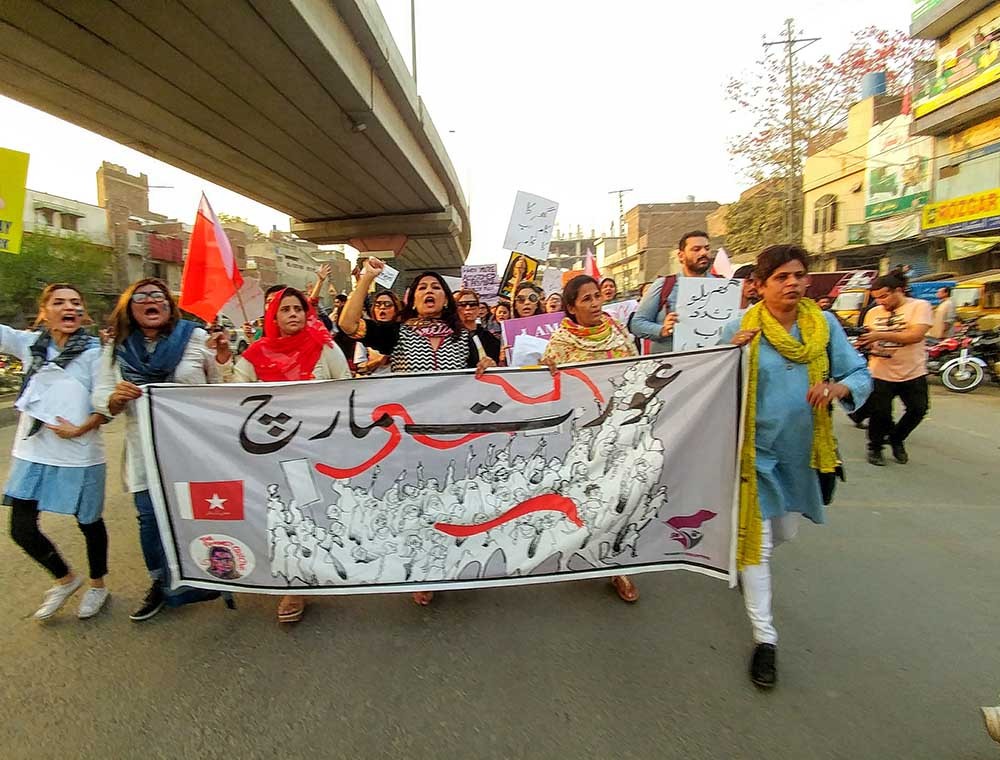

At first, the crowd outside Hamdard Hall at Lytton Road was too small, too neat, too elite. They included the ‘usual suspects’ of rallies that gained momentum through Facebook, comprising artistes and activists I love and support, a few TV actors, an as-yet-unsuccessful politician, leftists, high-profile professors, and a few socialites. My fly-on-the-wall reporter instinct urged me to try and get lost in a corner of the crowd, but I actively failed since the crowd wasn’t large enough for corners.
It was 20 minutes past the 4pm meeting time, so I believed that this was it. It would just be a handful of us marching for equality, no intersectionality on the menu. But even then, there was a spirit and sense of festivity and freshness in the crowd, even my Air Visual app cited that air quality was slightly better than Lahore’s usual "moderate".
But within ten minutes, neither the situation, nor the crowd remained moderate. A swathe of people of all ages, genders, classes, sexualities, traditions, and occupations, emerged from within Hamdard Hall, where a women’s day event was being held. A bus, a few vans, a handful of cars, and motorbikes arrived from the other end, and just like that our strength grew -- some say, to 300; others say it was closer to 600 -- and almost immediately we began marching.
At points we marched hard and fast; at other times it slowed down to a saunter. At points we took over an entire half of Lytton Rd, but for small stretches we were disciplined into allowing motorcyclists and rickshaws through. At points I spotted a current student, an old friend, a subject from a story I reported on; and yet at other times I couldn’t recognise a single face around me.
There were a few things, however, that remained constant through the 2.5kms to Charring Cross, one of which were the slogans. A Punjab University student, Faiqa Anwer, tirelessly and seamlessly led most of the sloganeering, although she was helped by two others. The megaphone they used had ‘AGHS’ inscribed on it; as if to mean that Asma, along with her organisation, was calling women to action from the beyond:
Jab tak aurat tang rahey gi, jang rahay gi, jang rahay gi! Pidarshahi ki tha, tha, tha…!
Pyar karo gay, pyar karain ge, jang karo gay, jang karain ge!
Another persistent element of the march were the onlookers: almost all men. Labourers put down their shovels on the sides of the road, madrassa students dropped their books and ran out to the balconies, shop owners left their counters unattended, if only for a minute, and motorists slowed down their cars, to gape. Some silently recorded the march on their Q-mobiles, others trying to stare us down, some scoffed and shrugged but kept gawking. A few laughed. But none could hide their wonder and confusion at seeing women boldly and brazenly occupying their public space, their wide eyes exposed them and the fault lines of our patriarchal society.
Lastly, the spirit of the march never wavered, it only grew. Outside Hamdard Hall, I felt that as a feminist I ought to be there, but my own self-consciousness didn’t allow me to feel any specific bond with those standing beside me, despite several organisers addressing me as "sister," to their credit.
But by the time we traversed half of Lytton Road, the slogans and the camaraderie had grown on me and I was ready to hold hands with the women marching with me. A little further on, and I was so enchanted with this group of women that had just taken over a space as public as Queens Road, I would’ve been down for a big group hug. And by the time we reached Charring Cross -- the same location where 14 people lost their lives in a bomb blast a little over a year ago -- instead of feeling fear or self-consciousness in a marred public space, instead of experiencing isolation in a crowd of acquaintances and strangers, instead of acting like a reporter for whom it’s okay to stand opposite the story and not inside it, I felt a sense of unity, and belonging, and most of all, I felt pride for us women who had come out to demand their rights. And pride’s not something Pakistan allows you to feel too often. So I let myself enjoy it.
The march did stand for specific demands: "An end to violence against women; reproductive rights; wage equality; and the liberation of bonded labourers, domestic workers, agriculture and factory workers, home based workers, and sex workers, from the existing feudo-capitalist-patriarchal system," among others. But simply put, the basic demand boiled down to: Aurat kya maangay? Azaadi.